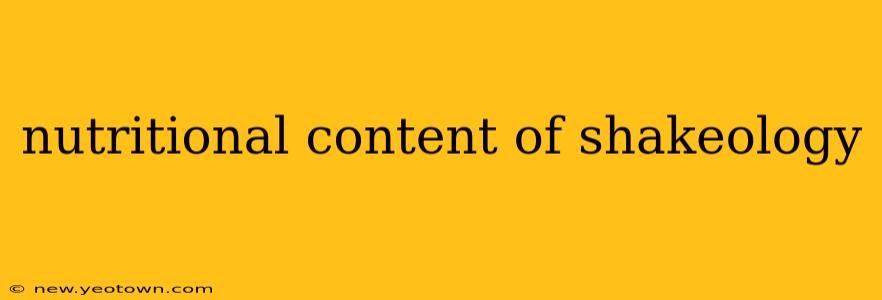Shakeology, the popular meal replacement shake, has garnered significant attention, sparking curiosity and debate about its nutritional profile. This in-depth exploration will delve into the nutritional content of Shakeology, addressing common questions and providing a comprehensive overview to help you decide if it aligns with your health and wellness goals. We'll explore its ingredients, nutritional values, and potential benefits and drawbacks, drawing on scientific evidence and expert opinions. Remember, individual nutritional needs vary, so consulting a healthcare professional or registered dietitian is crucial before making any significant dietary changes.
What are the main ingredients in Shakeology?
Shakeology's ingredient list varies slightly depending on the flavor, but generally includes a blend of protein sources (like whey and soy protein), fruits, vegetables, and various adaptogens and superfoods. The exact proportions aren't always clearly listed, leading to some speculation. However, the core emphasis is on providing a balanced mix of macronutrients and micronutrients, aiming for a complete nutritional profile. Key ingredients often include things like probiotics for gut health, antioxidants for cellular protection, and fiber for digestive support. The specific blend of these ingredients is designed to promote satiety, energy levels, and overall well-being. Understanding the core ingredients allows for better evaluation of its nutritional value relative to individual dietary needs.
How many calories are in a Shakeology shake?
Calorie content in Shakeology fluctuates based on the chosen flavor. Generally, a single serving falls within the range of 150-200 calories. This relatively low calorie count is often cited as a benefit for those managing weight or aiming for calorie restriction. It's important to note that this calorie count doesn't include any added ingredients like milk or fruits, which many individuals incorporate to customize their shake. This should be factored into your daily calorie intake calculations. The calorie information is usually prominently displayed on the product packaging and website.
What are the macronutrient ratios in Shakeology?
The macronutrient ratios (protein, carbohydrates, and fat) in Shakeology are also influenced by the specific flavor. Typically, it's designed to be relatively high in protein, providing around 15-20 grams per serving, which supports muscle growth and repair. Carbohydrate content is usually moderate, providing sustained energy. Fat content is generally lower, often under 5 grams per serving. These ratios contribute to its satiety-promoting properties. Understanding these ratios is crucial when considering Shakeology's role within a balanced diet and personalized dietary goals.
Does Shakeology contain added sugar?
Yes, Shakeology does contain added sugar, although the amount varies depending on the flavor. While the company emphasizes the use of natural sweeteners, it's crucial to check the nutrition label for the specific sugar content of your chosen flavor. Excessive sugar intake can negatively impact health, so it’s recommended to be mindful of this aspect and consider its contribution to your overall daily sugar intake. Individuals sensitive to sugar may need to carefully evaluate the sugar content against their individual dietary restrictions.
Is Shakeology a complete meal replacement?
Shakeology is marketed as a meal replacement, but whether it serves as a complete meal replacement is subjective and depends on individual needs and dietary requirements. While it provides a good source of protein, fiber, vitamins, and minerals, it may not fully satisfy the needs of individuals with specific dietary restrictions or conditions. Its nutritional profile should be evaluated against recommended daily allowances for vitamins, minerals, and macronutrients. For some, it might be a convenient supplement to a healthy diet, but for others, it might fall short of providing all the nutrients a complete meal should offer. Consulting a nutritionist or healthcare provider can help determine its suitability as a complete meal replacement for individual circumstances.
Is Shakeology gluten-free and dairy-free?
The gluten and dairy-free status of Shakeology depends on the specific flavor chosen. Some flavors are formulated to be gluten-free and dairy-free, while others may contain gluten or dairy-derived ingredients. Always check the product label carefully before consuming, especially if you have specific dietary restrictions or allergies. The company website usually provides a detailed list of ingredients for each flavor, allowing consumers to make informed choices. It’s essential to meticulously examine the ingredient list to verify its compatibility with your dietary needs.
This detailed analysis offers a comprehensive overview of Shakeology's nutritional content. Remember, nutritional needs are highly individualized. This information should not be considered a substitute for professional dietary advice. Always consult a healthcare provider or registered dietitian to determine if Shakeology aligns with your specific nutritional requirements and health goals.

